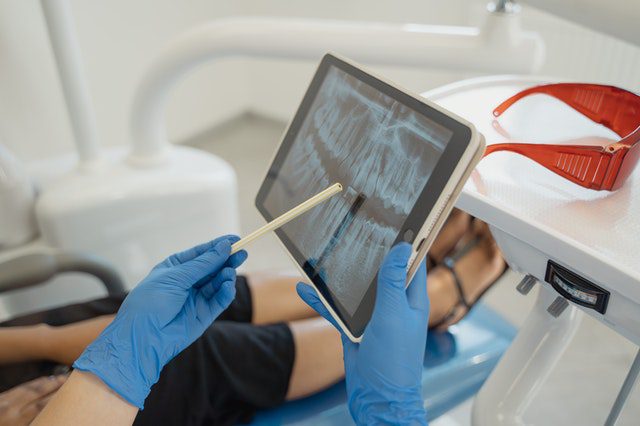Tooth loss, whether from facial trauma, age, illness, or other medical-related cause, is unpleasant for all of us. And when you have a damaged or diseased smile, it makes you… well, not want to smile. There are a number of methods oral and maxillofacial surgeons use to reconstruct and replace teeth. Currently, the gold standard of tooth replacement is dental implants. Why? They’re a holistic form of replacing lost teeth.
The biocompatible implant is placed in the socket and left to heal; your jaw bone will grow around it and fuse to it. Then, you’re fitted with an implant crown, which are usually porcelain. However, there are ceramic options for dental implants and crowns as well. This is the only method of replacing teeth where you’re truly replacing the tooth: its function, its looks, and its biological interactions with the jaw. It’s a permanent installation that preserves the health of your jaw, teeth and bite, and they look and feel so natural that many patients report sometimes forgetting they have them at all.
So, how do you decide if it’s time to talk to an oral surgeon about dental implant surgery?
6 Reasons You Should Consider Dental Implant Surgery
- You have missing and/or cracked teeth.
- You have unhealthy or infected teeth that need to be extracted.
- Your dentures don’t fit anymore… or you just hate them.
- X-rays of your jawbone show shrinkage and deterioration.
- Your face has started to look sunken in.
- Chewing and/or speaking properly is difficult.
If any of these things sound like you, dental implants are probably sounding pretty good right about now. Holistic mouth reconstruction that’s permanent, restorative and cosmetic? Yes, please. But hold on, because one unfortunate thing about dental implant surgery is that, while it is a great solution for a wide range of patients, it’s just not an option for others, as health and condition can make someone ineligible for dental implants.
Who is a Good Candidate for Dental Implants?
So how do you figure out whether or not you’re able to get dental implants? There’s a few things that your oral surgeon will analyze to make sure dental implant surgery will work for you:
- Are your remaining teeth and gums in good health?
- Is your overall health good?
- Does your jaw have enough density to take a dental implant?
- Are there any adverse factors like cancer treatments, diabetes, heart conditions, etc.?
- Do you chew and/or smoke tobacco?
Your oral surgeon will need to know any and all medications you take; and you’ve got to be honest about whether you consume tobacco – it can affect healing and cause the implant to fail. They’ll also likely ask you how you lost the tooth. Teeth lost as a result of illness and decay are a more complicated issue than a tooth lost from facial trauma; the restoration is different, and the implications about the patient’s overall health and healing can affect whether or not the surgeon will want to do the implant surgery.
But don’t worry; everything isn’t black and white on who is and isn’t eligible for dental implant surgery. In some cases, we strengthen the jaw with dental bone grafts. Sometimes, patients who stop smoking become eligible candidates in a fairly short amount of time. And lifestyle changes that can reverse Type II Diabetes and chronic heart conditions can change an oral surgeon’s outlook on using sedation dentistry on you safely, as well as their view of your body’s ability to fuse to the implant. Every patient and every case is different. The moral of the story with dental implant surgeries is that if you take the best care of yourself, your oral surgeon will be able to take the best care of you.








